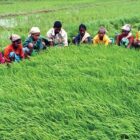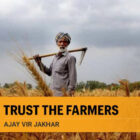Only a sustained and successful awareness campaign to reduce wastage of food and change consumer behaviour can prevent the climate change prophecies from coming true.
As one is coming to the realisation of the dire need to invest minds and money in a sustained awareness campaign to reduce wastage of food and change consumer behaviour; one realises the inevitability of the consequences of climate change prophecies coming true. The Prime Minister, Narendra Modi’s impassioned appeal for the reduction in the use of chemicals in agriculture is thus significant. In time though, the PM will realise it is easier to announce new approaches than to get the agriculture system to embrace it. This does not have to be so. Public policy and allocation of funds can play a critical role and change the trajectory.
The biggest threat to India is climate change. Many civilisations have disappeared and empires have collapsed due to shifting rainfall patterns or prolonged drought. These points were raised in the run-up to the climate change summit by the IPCC. Over 100 million hectares in India are in the process of serious degradation, desertification and salinisation. Situated in the tropics, India has witnessed a many-fold increase in extreme weather events since 1950 and will be severely impacted by production variability. Soils are being lost up to 100 times faster than they can form and high temperatures increase the incidence of pests and diseases. Contrary to the PM’s exhortations, these circumstances will only lead to use of greater chemicals on the farms. Issues around climate change cannot be addressed without the active participation of stakeholders and aid of indigenous and local knowledge of ground realities.
These alternative approaches require a paradigm shift towards principles of agro-ecology and weaning farmers by repurposing subsidies for ecosystem services. This requires a combination of different kinds of crop planting practices, different forms of mechanisation, aggregation and distribution of commodities. It is not easy and policy-making myopia discourages the recognition of feasible alternatives. As a society, we are not yet ready to commit to lifestyle trade-offs. More significantly, commoditisation of the food systems will impose stiff barriers in changing the status quo.
The bull run in commodity prices ended by 2013. Since then, food prices have generally remained subdued, instilling a sense of complacency amongst the public and those that influence policy. Consequently, there has been a steady but subtle shift in the narrative from agriculture to food, from yield to sustainability, from productivity to prosperity and from quantity to quality. Policies formulated shift their focus from supporting agriculture production to farmer livelihoods that are to be supported by schemes like PM Kisan. Additionally, public funding for research and the subsequent deployment of funds for fundamental research and human resources have reduced in real terms. This is worrying as it comes at a time when scientists are warning of impending challenges in food availability arising from climate change.
Policymakers are blissfully unmindful of their own inadequacies. India’s population will peak in 20 years and wild claims are being made that it will have a problem of 20 per cent surplus production. The recent surge in surpluses are deceiving and too meagre to justify such smug satisfaction.
Ironically, decision-makers are simultaneously targeting an increase in food production by 50 per cent by 2050. Sadly, this has become the cornerstone of our national policy and the metric for measuring farmer prosperity. To expect a system that nurtures the problem to transform itself is as ridiculous a notion as “zero budget farming” demonising “organic farming”.
Unrestrained profiteering by agri-businesses is expediting climate change. Starved of funds, the exhausted public research system has taken a similar and easier path to maximise farm yields by mono-cropping and use of chemicals and even encouraging agricultural practices that emit human-induced greenhouse gases. Economists will disagree but farm-gate prices have to rise substantially to account for the real cost of growing food for farmers to change practices and for agriculture to sequester carbon. Present practices extract a heavy environmental footprint, completing a vicious circle that makes agriculture more problematic. Meanwhile, agriculture itself intensifies climate change, going for compelling yield maximisation.
As a result, a few cereal crops are planted over millions of acres. This is at variance with conserving biodiversity, which is essential for safeguarding the global commons. Worse, higher-yielding seeds are quickly adopted by farmers — now over 80 per cent of most crop production comes from a handful of varieties in each crop type. Additionally, growing ecologically unsuitable crops in particular ecosystems is literally killing the planet. Policymakers refuse to grasp that food systems are breaching a breaking point of sustainability as food production policies do not reflect the exigency for change. Unless India invests handsomely in building awareness to reduce food waste and change consumer behaviour, climate change prophecies will come true.




